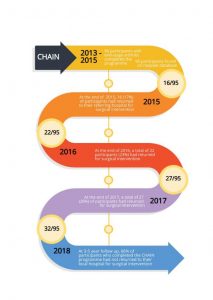Since it’s creation, a number of rigorous evaluations have demonstrated the efficacy of the CHAIN programme for improving function and pain in people with hip osteoarthritis. In addition, we have reported the methodology behind the design of the CHAIN programme and CLEAT trial. These reports are summarised below.
May 2023 – BMC Musculoskeletal Disorders
The CHAIN (Cycling against Hip pAIN) intervention is a group cycling and education intervention conceived as a way of implementing the NICE guidance. CycLing and EducATion (CLEAT) is a pragmatic, two parallel arm, randomised controlled trial comparing CHAIN with standard physiotherapy care for the treatment of mild-to-moderate hip osteoarthritis. This article describes the protocol of the CLEAT study.
July 2020 – SAGE Open Medicine
This article reports the findings from the second CHAIN programme, delivered in Bournemouth, Dorset between February 2018 and September 2019. Following completion of the initial programme, the local National Health Service (NHS) trust, a secondary care provider, commissioned the CHAIN programme for a further 18 months. Patients with hip pain who were referred to the local NHS hospital for surgical opinion were assessed for eligibility by an orthopaedic surgeon in the outpatient department. The CHAIN programme was offered to patients who were judged to be not suitable for surgical intervention. The findings from this evaluation suggest that a six week cycling and education intervention for the treatment of hip osteoarthritis can provide benefits to function, pain and quality of life for patients referred to secondary care for surgical opinion of their hip pain.
April 2020 – World Congress on Osteoarthritis
This abstract reports some of the methodological challenges that should be considered in the design of randomised controlled trials of group based versus one-to-one interventions in the treatment of osteoarthritis. These challenges highlight the tension between methodological ideals and practical limitations, and the importance of designing a pragmatic trial which models the real-world scenario within our local health care setting.
Self-management of hip osteoarthritis five years after a cycling and education treatment pathway
February 2020 – Healthcare
This article reports the results from a cross-sectional survey, conducted to collect data from participants who completed the CHAIN programme between 2013 and 2015. The questionnaire was designed to collect data on whether participants on the CHAIN programme had continued to self-manage their hip osteoarthritis, five years after completing the course. Eighty-three participants (87%) responded to the survey. Five years (range 4–6) after completion of a six-week cycling and education programme, 37 (45%) participants had not returned to their GP for further treatment of their hip pain, and 47 (57%) had not pursued surgical intervention. All participants were still engaged in at least one physical activity per week. Eighty (96%) participants reported an increase in knowledge of self-managing their symptoms. The findings from this study suggest that many patients are motivated to self-manage their hip osteoarthritis, five years following a six-week cycling and education treatment pathway that encourages lifestyle change.
Snapshot survey of physiotherapy practice for patients with hip osteoarthritis in the public sector
April 2017 – European Journal of Physiotherapy
This online survey was conducted to gain a snapshot view of physiotherapy practice within the public sector in the UK. Sixty-two physiotherapists from 25 counties in the UK and Wales responded. The median waiting time from referral to physiotherapy treatment was 5 weeks and patients were seen a median of 3 times. The median total number of hours treated was 2 hours, and the median duration time for treatment was 8 weeks. All respondents used strengthening exercises, 73% used stretches, 50% cardiovascular exercise, 73% balance exercises and 26% proprioceptive exercises. Thirty-nine percent of respondents use both strengthening and cardiovascular exercises, and provide an education leaflet, as contained within National Institute for Health and Clinical Excellence (NICE) guidance.
November 2016 – International Journal of Orthopaedic and Trauma Nursing
This article reports the results of the first CHAIN programme, delivered from 2013 until 2015 at a leisure centre in Bournemouth, Dorset. All participants were referred from primary care (either through their GP or through self-referral). Participants completed six weeks of cycling and education, delivered by a physiotherapist and exercise specialist. Participants reported significant improvements to pain and function from pre to post-programme. Objectively measured function also demonstrated a significant improvement in sit-to-stand and Timed Up and Go scores. In addition, participants reported an increase in confidence in managing their hip pain, and an increase in motivation to exercise.
November 2015 – Research Involvement and Engagement
This article reports how patients and members of the public were involved in the design of the CLEAT study, a randomised controlled trial comparing the CHAIN programme to standard care physiotherapy, in the treatment of hip osteoarthritis. A patient and public involvement consultation group provided invaluable feedback and suggestions which impacted on the design and quality of the research project and the intervention. Key changes to the intervention included extending the duration of the cycling programme from 6 to 8 weeks, and inclusion of an exercise diary to promote adherence to the intervention. Key feedback regarding the design of the research and funding application included suggestions for methods of dissemination, and confirmation of the primary outcome measure.
February 2015 – BMJ Case Reports
This article reports the results of the CHAIN programme for a 71-year-old man presenting with hip osteoarthritis, in addition to a complex range of comorbidities. The gentleman made significant improvements to his Oxford Hip Score, Hip disability and Osteoarthritis Outcome Score (HOOS) function, sit-to-stand score, Timed Up and Go score, pain and hip flexion, in addition to a weight loss of 2.1kg. The gentleman reported an ‘amazing difference’ to his affected hip, leg and improved fitness.






